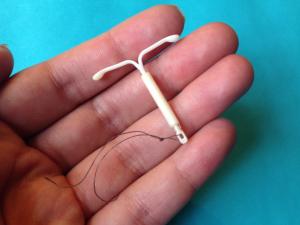I was surprised to see an article from the New York Times being negative about contraception. They don’t get the intrinsic problem with contraception but they see the eugenic problem when society uses contraception as a poverty cure. The new wave is pushing the IUD on poor women.
The Wider Use of IUDs
The Times begins factually,
Over the past decade, more and more women have begun using long-acting, reversible birth control methods like intrauterine devices and implants. These birth control methods are highly effective at preventing pregnancy but were previously not widely accessible because of high costs and lack of knowledge among health care providers.
But by the second paragraph, they are already into the problem:
However, many researchers, advocates and policymakers aren’t selling their rise solely as a victory for women’s health. They claim IUDs and implants may be a powerful new tool to fight poverty. This sort of language should set off alarm bells because the idea that limiting women’s reproduction can cure society’s ills has a long, shameful history in the United States.
IUD Expansion Similar to Forced Sterilization
The authors explain a bit of the history of forced sterilization programs, then relate these to the current situation:
Today, this age-old idea that reproduction is to blame for societal problems has seen a resurgence in the current enthusiasm around long-acting, reversible contraception.
We can see echoes of this view in how some politicians argue for expanded access to birth control as a tool to address intergenerational poverty. We can see it in the priorities of philanthropic funders and in glowing media coverage about the promise of long-acting birth control that produces headlines like “Can the IUD Prevent Poverty, Save Taxpayers Billions?”
Promoting IUDs and implants is certainly less egregious than state-sponsored eugenics. But promoting them from a poverty-reduction perspective still targets the reproduction of certain women based on a problematic and simplistic understanding of the causes of societal ills. […]
We also have concerns about how this emphasis on birth control as a tool of poverty reduction actually plays out in clinics. Claims about the social benefits of increasing the use of IUDs and implants can contribute to a narrative that says these methods are the best methods for everyone and that a program’s success should be judged by the numbers of IUDs and implants its providers insert. This, in turn, can contribute to providers neglecting individual women’s preferences when it comes to birth control: applying subtle pressure to use long-acting contraception, for example, or resisting requests to remove IUDs and implants.
The NYT even notes how this attitude has had a negative effect on minority communities.
Given these biases, and the long history of coercion, it is no wonder that research has found that more than 40 percent of black and Latina womenthink the government promotes birth control to limit births among communities of color. Such beliefs should not be dismissed as conspiracy theories but recognized as understandable reactions to lived experiences.
You can read the rest: just realize the authors are clearly still pro-contraception in other cases.
A Priest’s Perspective
As a priest, I am obviously not told to get an IUD. However, I have heard stories of women feeling forced to get an IUD. One woman even told me how she felt the doctor pushed her to get an IUD while she was still in the delivery room after giving birth. Most of these conversations have been in Spanish to give you an idea of the socioeconomics.
Paul VI predicted using contraception for such population control back in 1968.
Careful consideration should be given to the danger of this power passing into the hands of those public authorities who care little for the precepts of the moral law. Who will blame a government which in its attempt to resolve the problems affecting an entire country resorts to the same measures as are regarded as lawful by married people in the solution of a particular family difficulty? Who will prevent public authorities from favoring those contraceptive methods which they consider more effective? Should they regard this as necessary, they may even impose their use on everyone. It could well happen, therefore, that when people, either individually or in family or social life, experience the inherent difficulties of the divine law and are determined to avoid them, they may give into the hands of public authorities the power to intervene in the most personal and intimate responsibility of husband and wife.







